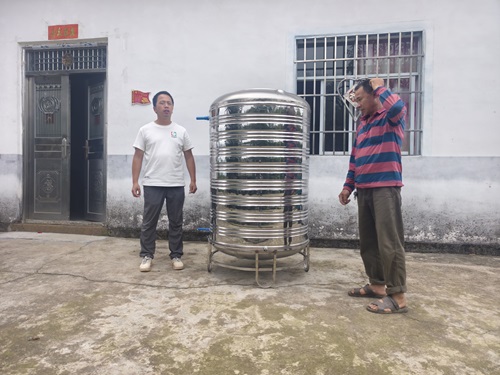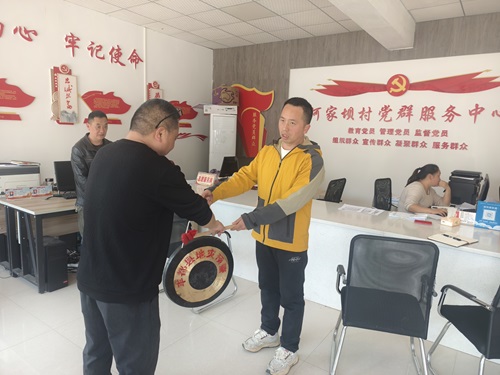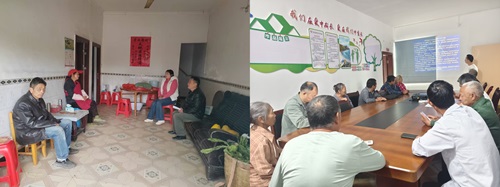Home \ Project News \ What HPP Has Done for the Elderly in Rural Areas Under the Impact of Climate Change
Write by: Yin Yueyuan, Communications Officer
Photos by: Xiao Wei, Co-Project Leader
In recent years, extreme weather events caused by global climate change have become increasingly frequent and severe. Extreme weather directly impacts people’s lives. Li Xiaojun and Xiao Wei, project staff of HPP in Hejiaba Village, Fengdu County, Chongqing, have also observed the effects of climate change on the villagers. Through field research, they identified irregular water supply, geological disasters triggered by extreme weather, and high-temperature heatwaves as major challenges facing the community.
Supported by the Harmony Community Foundation and YunnanSynetics partnership for Civic Organization Development, HPP officially launched the Pilot Project on Enhancing Climate Resilience for the Rural Elderly in Fengdu County, Chongqing, in March 2025. Following a needs assessment and comprehensive evaluation, the project covered 50 households across three groups in Hejiaba Village. Tailored solutions were developed to address the specific difficulties faced by different villagers.
1. Installing Water Storage Tanks to Improve Drinking Water Conditions
Drinking water is a critical resource in rural areas. As temperatures rise year by year, groundwater levels decline, causing a significant reduction in well water. During droughts caused by extreme weather, the local water plant is also unable to supply tap water due to water shortages, leading to frequent drinking water shortages for the villagers.
Based on the needs reported by the villagers, project staff conducted inspections and provided subsidies for the installation of water storage tanks, which were carried out by the villagers themselves. Among the subsidized households were four elderly people living alone. Before the tanks were installed, fetching water during extreme weather events was extremely inconvenient. Some households even drank impure river water directly, which poses long-term health risks. With the tanks, these villagers now have clean stored water and no longer need to fetch water from distant sources or drink from the river.

2. Providing Emergency Evacuation Supplies for the Village
Some houses in Hejiaba Village are located on hillsides. During summer rains in 2024, a landslide occurred in the middle of the night. Fortunately, it was detected in time, and no casualties were reported. However, the village committee realized that emergency evacuation supplies were insufficient for such situations.
“When a landslide happens at night, some elderly people can’t hear well—shouting alone isn’t enough,” said a villager.
In response, the project provided the village committee with high-intensity flashlights, gongs, increasing the quantity of emergency evacuation supplies and further ensuring villagers’ safety.

3. Transforming a Cave into a Cool Retreat
“Staying in an air-conditioned room in summer costs about 200 yuan per month in electricity. For those of us without pensions, that’s a significant expense.”
As temperatures rise, villagers in Hejiaba are spending more time in air-conditioned rooms. The resulting electricity costs have become a burden for elderly people without pensions.
Hejiaba Village has a natural cave that villagers use to escape the summer heat. However, the cave’s interior was muddy and poorly equipped. After discussions, villagers decided to renovate the space with project support. Many enthusiastically contributed labor to the renovation.
Originally, the plan was to clear about 20 meters of soil from the cave floor. With the villagers’ help, more than 30 meters were cleared, and the height was increased so that a person 1.7 meters tall can now walk upright inside. The renovated cave has a larger activity area and can accommodate over 40 people at once. Located at the border between Qinggangya Village and Hejiaba Village, the cave is about 500–800 meters from nearby homes. Those living farther away travel by motorcycle or tricycle. Visitors bring their own food and water, and a villager is responsible for managing the site. The improved cave provides a better cooling environment, and about 40 villagers are expected to use it during this year’s hot weather.
4. Conducting Climate Change Training and Home Visits
In addition to providing hardware facilities, project staff also conducted promotional training sessions on natural disasters and climate-related challenges faced by Hejiaba Village, along with one-on-one home visits for awareness-raising and assistance.
In April, given the village’s susceptibility to landslides and mudslides, project staff organized geological disaster drills for 23 households. Villagers learned basic monitoring methods and evacuation procedures and participated in practice drills under guidance.
In May, to improve drinking water conditions, staff held a centralized training session for 15 villagers on proper water collection and storage. Topics included water source selection, facility maintenance, and safety measures to ensure access to safe drinking water.
In June, 22 villagers attended a training session on staying cool in summer. The training covered diet, hydration, clothing, and outdoor activities, helping villagers adopt scientifically sound practices to avoid harm from extreme heat.
Project staff also conducted monthly home visits, totaling 80 visits during the project period. During these visits, they raised awareness about climate change, documented climate-related events in the village, gathered suggestions on cave renovations, and inspected drinking water conditions, household water storage facilities, water sources, and water storage conditions.
Elderly people are more vulnerable to climate change, and extreme heat can cause them greater harm. How to help the elderly adapt to climate change through daily life interventions has been a focus of HPP’s work in recent years. The Pilot Project on Enhancing Climate Resilience for the Rural Elderly in Fengdu County is a small but practical step by HPP in addressing climate change. The project has received support and recognition from the local village committee and villagers. As one villager remarked during the project closing meeting, “We should pay more attention to climate change, learn how to adapt, and strengthen our ability to protect ourselves.” HPP will continue to explore sustainable projects to help more people adapt to and thrive in a changing climate.

Project Introduction:
The Pilot Project on Enhancing Climate Resilience for the Rural Elderly in Fengdu County, Chongqing, is supported by the Harmony Community Foundation and YunnanSynetics partnership for Civic Organization Development. This three-month project aims to improve the climate resilience of the elderly in Hejiaba Village through activities such as installing water storage tanks, renovating a cooling cave, providing emergency supplies and cooling fans, and conducting emergency drills.


This article reflects the author’s views and does not represent the stance of the funding organizations.